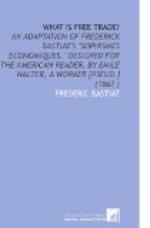2. It is not true that the labor of one country can be crushed by the competition of more favored climates. The statement is not true that the unequal facility of production, between two similar branches of industry, should necessarily cause the destruction of the one which is the least fortunate. On the turf, if one horse gains the prize, the other loses it; but when two horses work to produce any useful article, each produces in proportion to his strength; and because the stronger is the more useful it does not follow that the weaker is good for nothing. Wheat is cultivated in every section of the United States, although there are great differences in the degree of fertility existing among them. If it happens that there be one which does not cultivate it, it is because, even to itself, such cultivation is not useful. Analogy will show us, that under the influences of an unshackled trade, notwithstanding similar differences, wheat would be produced in every portion of the world; and if any nation were induced to entirely abandon the cultivation of it, this would only be because it would be her interest to otherwise employ her lands, her capital, and her labor. And why does not the fertility of one department paralyze the agriculture of a neighboring and less favored one? Because the phenomena of political economy have a suppleness, an elasticity, and, so to speak, a self-levelling power, which seems to escape the attention of the school of protectionists. They accuse us of being theoretic, but it is themselves who are so to a supreme degree, if the being theoretic consists in building up systems upon the experience of a single fact, instead of profiting by the experience of a series of facts. In the above example, it is the difference in the value of lands which compensates for the difference in their fertility. Your field produces three times as much as mine. Yes. But it has cost you ten times as much, and therefore I can still compete with you: this is the sole mystery. And observe how the advantage on one point leads to disadvantage on the other. Precisely because your soil is more fruitful it is more dear. It is not accidentally but necessarily that the equilibrium is established, or at least inclines to establish itself: and can it be denied that perfect freedom in exchanges is of all systems the one which favors this tendency?
I have cited an agricultural example; I might as easily have taken one from any trade. There are tailors at Barnegat, but that does not prevent tailors from being in New York also, although the latter have to pay a much higher rent, as well as higher price for furniture, workmen, and food. But their customers are sufficiently numerous not only to reestablish the balance, but also to make it lean on their side.
When, therefore, the question is about equalizing the advantages of labor, it would be well to consider whether the natural freedom of exchange is not the best umpire.




